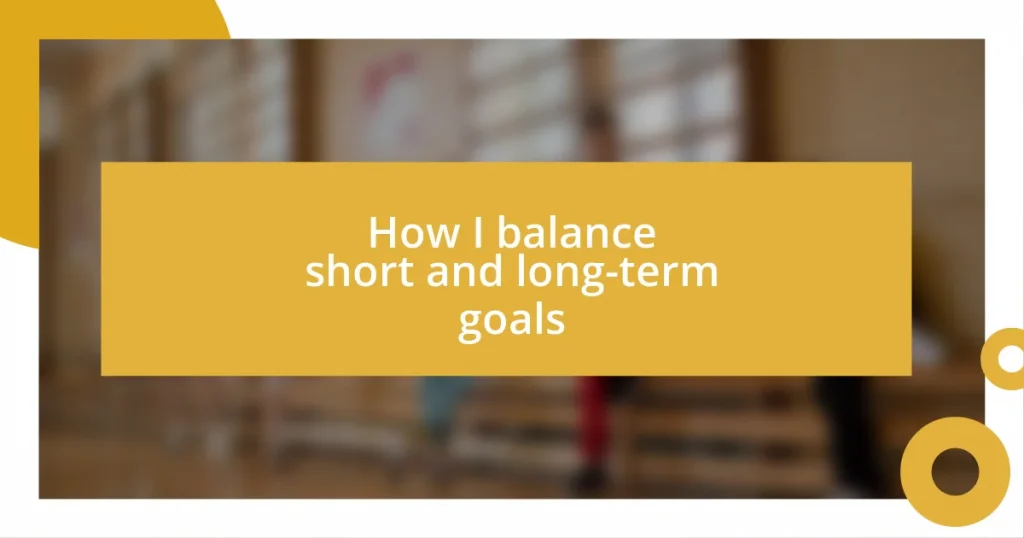Key takeaways:
- Short-term goals help break down larger objectives into manageable tasks, providing immediate motivation and opportunities for reflection.
- Long-term goals offer direction and purpose, shaping short-term actions and fostering resilience through patience and consistent effort.
- Regular assessment and flexibility in goal-setting are essential for maintaining motivation and adjusting plans to align with personal growth and changing circumstances.

Understanding short term goals
Short-term goals are often the stepping stones on the path to achieving larger aspirations. I remember setting a goal to read one book a month. It wasn’t just about the reading; it was about carving out time in my busy schedule, which ultimately helped me cultivate a deeper understanding of the topics that fascinated me.
When I reflect on my experience, I realize how powerful short-term goals are in giving us a sense of accomplishment. They can transform overwhelming objectives into manageable tasks. For instance, launching a major project can feel daunting, but breaking it down into weekly tasks made it less intimidating for me. Isn’t it amazing how a small win fuels your motivation for the next goal?
I believe short-term goals also provide opportunities for reflection and adjustment. A few months ago, I aimed to improve my fitness by working out three times a week. But, as I started, I discovered that my schedule didn’t allow for that. I reassessed and shifted my goal to twice a week, which not only kept me consistent but also encouraged me to listen to my body. Isn’t that what it’s all about—finding what works best for you?

Understanding long term goals
Long-term goals serve as the guiding stars in our journey, providing direction and purpose. I’ve found that having a vision of where I want to be in 5 or even 10 years can deeply influence my daily decisions. They’re the framework that shapes my short-term goals, ensuring they create a meaningful path toward something bigger.
- Long-term goals require patience and persistence; they often take years to achieve.
- They help prioritize daily actions and choices based on my values and aspirations.
- Setting long-term goals fosters resilience; setbacks become learning opportunities instead of roadblocks.
- They encourage me to dream bigger and continuously assess my purpose.
For instance, a few years ago, I set a long-term goal to become proficient in a second language. Initially, it felt daunting, but each small conversation improved my confidence and fluency, revealing how truly valuable long-term commitments can be.

Importance of goal balance
Balancing short and long-term goals is crucial for maintaining motivation and direction. I often find that when I focus solely on one aspect, I can miss out on valuable growth. The blend of both enables me to enjoy immediate achievements while still keeping my sights set on those bigger dreams. When I managed to finish a challenging project, the sense of accomplishment ignited my drive toward my long-term ambition, creating a satisfying loop of motivation.
Moreover, achieving short-term goals acts as a recruitment tool for energy and focus. For example, after I accomplished my short-term goal of organizing my workspace, I felt a surge of clarity that motivated me to tackle a long-term goal I had been avoiding—my new business plan. It’s incredible how minor victories can set the stage for significant changes. They remind me that progress isn’t always about grand gestures but often about the little wins adding up over time.
In my experience, if I neglect my short-term goals, I start to feel stagnant. Balancing these goals fosters a productive rhythm in my life, easing anxiety while fueling my passion for long-term projects. When I take a step back and celebrate those small milestones, I see the path I’m on more clearly. I’m reminded that balance is not just a strategy; it’s a philosophy that nurtures success across all dimensions of my life.
| Short-term Goals | Long-term Goals |
|---|---|
| Provide immediate satisfaction and motivation | Offer direction and purpose for the future |
| Encourage reflection and adaptability | Require patience and resilience for achievement |
| Enhance daily productivity | Shape long-term aspirations and dreams |

Strategies for balancing goals
One effective strategy for balancing goals is to regularly assess my progress. I find it helpful to set aside time each week to reflect on what I’ve accomplished with my short-term goals and how they align with my long-term aspirations. This practice keeps me accountable and allows me to celebrate little victories, reinforcing my motivation.
Moreover, I opt for the “20% time” principle, dedicating part of my week to work on long-term projects that often get sidelined. This approach not only allows me to make consistent progress on my bigger dreams but also injects a sense of creativity into my routine. Have you ever noticed how nurturing a passion project can breathe new life into your daily tasks? For me, when I focus a few hours each week on developing my writing skills, I find my day-to-day work becomes more enriching.
Finally, I advocate for flexibility. Life is unpredictable, and it’s essential to adapt our strategies as circumstances change. For instance, there have been moments when a sudden opportunity arose, prompting me to pivot my focus temporarily. I’ve learned that being open to adjustments ensures I stay aligned with my overall vision while still tackling those vital day-to-day tasks. After all, doesn’t the journey of balancing goals often teach us more than the end result itself?

Tools for tracking progress
Tools for tracking progress are indispensable in my goal-setting journey. I swear by digital applications like Trello and Notion. They help me visually map out my tasks, breaking down long-term goals into manageable short-term actions. There’s nothing quite like dragging a card into the “completed” column after pounding away at a project. How satisfying is it to see progress unfold right before your eyes?
I also maintain a bullet journal, which allows me to get creative while tracking my advancements. I can doodle, jot down reflections, and even track my mood, all in one place. It’s fascinating how writing things down not only solidifies my intentions but also provides a precious moment of mindfulness. Have you found that reflecting on your accomplishments, even the small ones, boosts your motivation? Dropping in highlights each week has transformed my perception of progress.
Lastly, I leverage the power of habit tracking. By using a simple checklist for daily actions, I can witness my dedications add up over time. It’s remarkable how such a straightforward method transforms abstract ambitions into tangible results. Looking back at my filled-out tracker, I often experience a rush of pride, motivating me to pursue my long-term goals even further. Isn’t it empowering to see how each daily choice propels me forward?

Reflecting on goal achievement
Reflecting on goal achievement is a powerful exercise that I embrace regularly. I remember a time when I felt stuck and overwhelmed by my short-term tasks. It was only when I took a step back, reviewed my journey, and acknowledged how far I’d come that I regained clarity and motivation. Isn’t it incredible how pausing to appreciate progress can ignite a new drive within us?
There’s something deeply rewarding about jotting down accomplishments, no matter how small. Once, I celebrated completing a challenging project that seemed insurmountable at first. Writing that victory in my journal made me realize how crucial those moments are for my emotional well-being. Have you ever noticed how this practice adds a layer of positivity to your day? It transforms the daunting landscape of goals into a tapestry of achievements, giving us the momentum to keep pushing forward.
I often explore the emotions tied to my successes and setbacks alike. Reflecting on what went right, or what could have been done differently, gives me profound insights. For instance, I recall struggling with a writing project that initially eluded me. By diving into my thoughts and analyzing the experience, I uncovered the importance of perseverance and flexibility that ultimately shaped my approach to future challenges. How often do we neglect those valuable lessons? Each reflection reveals not just the “what” but also the “why,” deepening my understanding of my personal journey.

Adjusting goals for future success
Adjusting my goals for future success requires a willingness to pivot when necessary. I recall a time when I set a lofty target for my fitness journey but found myself struggling to keep pace. Instead of feeling defeated, I recalibrated my goals—setting smaller benchmarks that felt achievable. This allowed me to build momentum and, honestly, it felt liberating to adapt rather than adhere rigidly to an original plan.
The beauty of flexible goal-setting lies in the unexpected opportunities it creates. I remember shifting my focus from merely completing marathons to enjoying the overall journey of fitness. This adjustment brought so much joy, allowing me to explore new activities like yoga and hiking, which became refreshing aspects of my routine. Have you ever considered how an unexpected detour could lead to fulfilling experiences? Embracing change nurtures growth, and it’s those small shifts that often yield the richest rewards.
Another key to successful goal adjustment involves regularly checking in with myself. I’ve found that taking time—maybe weekly or monthly—to analyze my progress and feelings around my goals is crucial. One month, I noticed that my enthusiasm for a big project waning. This feeling prompted me to reassess and break the project into smaller segments, sparking renewed excitement. How often do we forget to listen to our own instincts? Trusting my intuition not only keeps my objectives aligned with my passions but also fuels my motivation to move forward.















